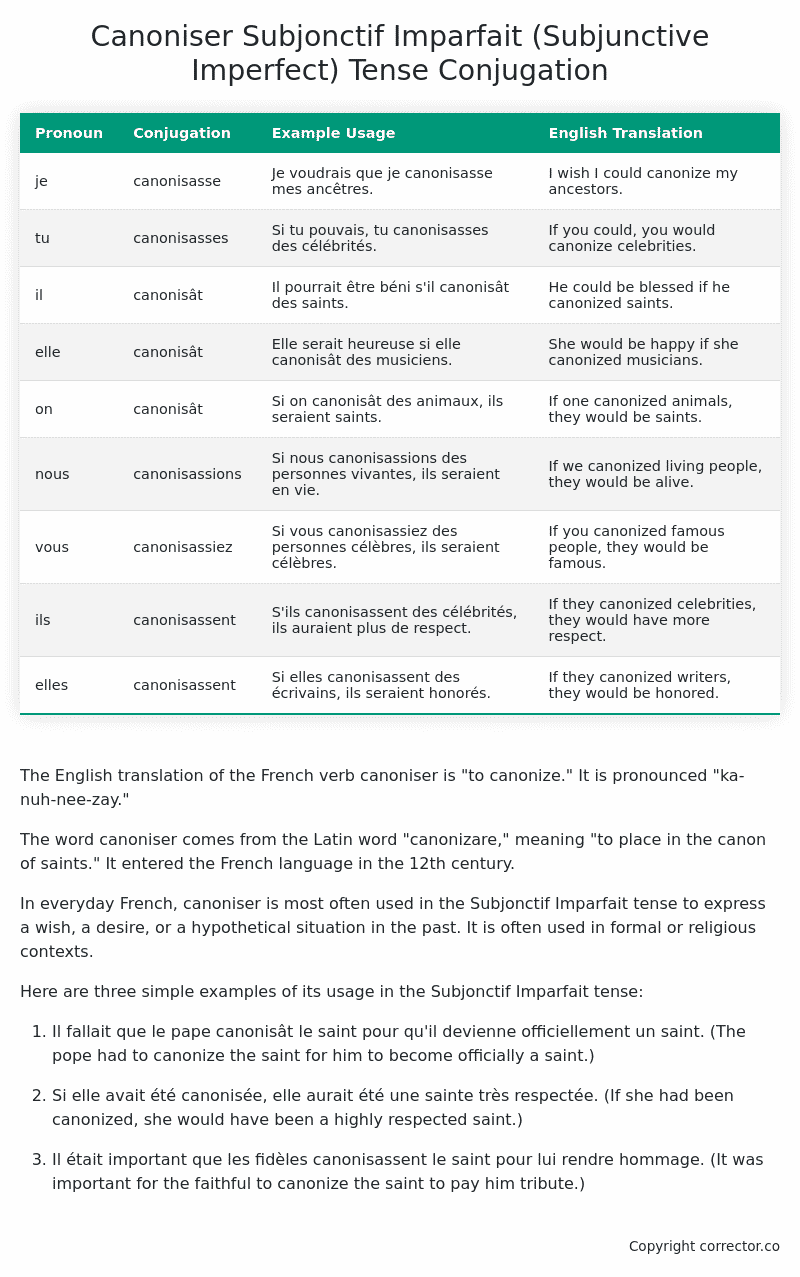Subjonctif Imparfait (Subjunctive Imperfect) Tense Conjugation of the French Verb canoniser
Introduction to the verb canoniser
The English translation of the French verb canoniser is “to canonize.” It is pronounced “ka-nuh-nee-zay.”
The word canoniser comes from the Latin word “canonizare,” meaning “to place in the canon of saints.” It entered the French language in the 12th century.
In everyday French, canoniser is most often used in the Subjonctif Imparfait tense to express a wish, a desire, or a hypothetical situation in the past. It is often used in formal or religious contexts.
Here are three simple examples of its usage in the Subjonctif Imparfait tense:
-
Il fallait que le pape canonisât le saint pour qu’il devienne officiellement un saint. (The pope had to canonize the saint for him to become officially a saint.)
-
Si elle avait été canonisée, elle aurait été une sainte très respectée. (If she had been canonized, she would have been a highly respected saint.)
-
Il était important que les fidèles canonisassent le saint pour lui rendre hommage. (It was important for the faithful to canonize the saint to pay him tribute.)
Table of the Subjonctif Imparfait (Subjunctive Imperfect) Tense Conjugation of canoniser
| Pronoun | Conjugation | Example Usage | English Translation |
|---|---|---|---|
| je | canonisasse | Je voudrais que je canonisasse mes ancêtres. | I wish I could canonize my ancestors. |
| tu | canonisasses | Si tu pouvais, tu canonisasses des célébrités. | If you could, you would canonize celebrities. |
| il | canonisât | Il pourrait être béni s’il canonisât des saints. | He could be blessed if he canonized saints. |
| elle | canonisât | Elle serait heureuse si elle canonisât des musiciens. | She would be happy if she canonized musicians. |
| on | canonisât | Si on canonisât des animaux, ils seraient saints. | If one canonized animals, they would be saints. |
| nous | canonisassions | Si nous canonisassions des personnes vivantes, ils seraient en vie. | If we canonized living people, they would be alive. |
| vous | canonisassiez | Si vous canonisassiez des personnes célèbres, ils seraient célèbres. | If you canonized famous people, they would be famous. |
| ils | canonisassent | S’ils canonisassent des célébrités, ils auraient plus de respect. | If they canonized celebrities, they would have more respect. |
| elles | canonisassent | Si elles canonisassent des écrivains, ils seraient honorés. | If they canonized writers, they would be honored. |
Other Conjugations for Canoniser.
Le Present (Present Tense) Conjugation of the French Verb canoniser
Imparfait (Imperfect) Tense Conjugation of the French Verb canoniser
Passé Simple (Simple Past) Tense Conjugation of the French Verb canoniser
Passé Composé (Present Perfect) Tense Conjugation of the French Verb canoniser
Futur Simple (Simple Future) Tense Conjugation of the French Verb canoniser
Futur Proche (Near Future) Tense Conjugation of the French Verb canoniser
Plus-que-parfait (Pluperfect) Tense Conjugation of the French Verb canoniser
Passé Antérieur (Past Anterior) Tense Conjugation of the French Verb canoniser
Futur Antérieur (Future Anterior) Tense Conjugation of the French Verb canoniser
Subjonctif Présent (Subjunctive Present) Tense Conjugation of the French Verb canoniser
Subjonctif Passé (Subjunctive Past) Tense Conjugation of the French Verb canoniser
Subjonctif Imparfait (Subjunctive Imperfect) Tense Conjugation of the French Verb canoniser (this article)
Subjonctif Plus-que-parfait (Subjunctive Pluperfect) Tense Conjugation of the French Verb canoniser
Conditionnel Présent (Conditional Present) Tense Conjugation of the French Verb canoniser
Conditionnel Passé (Conditional Past) Tense Conjugation of the French Verb canoniser
L’impératif Présent (Imperative Present) Tense Conjugation of the French Verb canoniser
L’infinitif Présent (Infinitive Present) Tense Conjugation of the French Verb canoniser
Struggling with French verbs or the language in general? Why not use our free French Grammar Checker – no registration required!
Get a FREE Download Study Sheet of this Conjugation 🔥
Simply right click the image below, click “save image” and get your free reference for the canoniser Subjonctif Imparfait tense conjugation!

Canoniser – About the French Subjonctif Imparfait (Subjunctive Imperfect) Tense
Formation
Common Everyday Usage Patterns
Interactions with Other Tenses
Subjonctif Présent
Indicatif Passé Composé
Conditional
Conditional Perfect
Summary
I hope you enjoyed this article on the verb canoniser. Still in a learning mood? Check out another TOTALLY random French verb conjugation!


